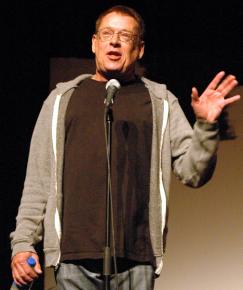Time to demand full equality
and report on meetings in the Midwest to mobilize for the National Equality March in Washington, D.C.
IN SPEAKING engagements in Chicago and Madison, Wis., veteran activist Cleve Jones encouraged people to mobilize for the October 11 National Equality March in Washington, D.C.
Jones, who worked with the famous gay political leader Harvey Milk in San Francisco, is an author and founder of the AIDS Memorial Quilt. He spoke to a capacity crowd of 250 in Chicago on August 29 and an audience of 400 in Madison August 31. Among the two sponsors of the events were Haymarket Books, Join the Impact Chicago, Young Chicago Authors, Chicago Public Radio WBEZ and the Madison-based grassroots coalition LGBTI Equality Now.
In Chicago, members of Young Chicago Authors kicked off the event, performing moving spoken-word pieces in support of LGBT liberation. Also on hand were members of International Brotherhood of Teamsters Local 743, who have been on strike at SK Hand Tools since they received notice that their health care coverage had been abruptly terminated.
But the highlight of both nights was Jones, who related his experience becoming political by learning about the anti-Vietnam war movement, the women's movement and finally the gay liberation movement—all of which he saw as parts of the same movement for social and economic justice. Jones hitchhiked to San Francisco to become a part of the movement in which he was "allowed to participate in something that was truly brand new," he told the Madison audience.

While the recent Oscar-winning movie Milk has introduced a new audience to the gay liberation movement of the 1960s and ’70s, Jones also spoke of the effect of AIDS and the conservative backlash of the Reagan years on activists who continued to work for justice for lesbian, gay, bisexual and transgender (LGBT) people.
While protesting Reagan's Health and Human Services Department for close its eyes to the disease while it spread, Jones had the idea of starting the AIDS quilt to humanize what the media portrayed as a disease that was "killing all the right people," as one bumper sticker of the time asserted.
Jones argued for the National Equality March on October 11 and for the need for a new national movement for LGBT civil rights. He also spoke of his disillusionment with the Obama administration, which, despite promises to fight for LGBT rights, has upheld the Defense of Marriage Act and “don't ask, don't tell” policy against gays and lesbians in the military. As Jones pointed out, the demand to end these bigoted policies must come from below.
The National Equality March, Jones pointed out, has a single demand of "full equality for all LGBT people in all matters governed by civil law in all 50 states. Now." The narrowing of expectations to only individual piecemeal rights, Jones said, actually represents a failed strategy that he and other believe needs to be shifted.
With a broadening left and public opinion moving in favor of LGBT rights, he said, this is "prime time" for the movement to demand full equality.
Jones recalled the fight to defeat the Briggs Initiative in California in 1978--an attempt to ban gays and lesbians from working in public schools. The victory was won by a grassroots movement that shifted public opinion by going door to door in communities across the state and marching in the streets demanding equal rights.
Likewise, he reminded the audience, if the civil rights movement of the 1960s was able to achieve legislation demanding full protection under the law for Blacks, the same is possible for gays and lesbians many decades later. "Only when large numbers of people demand everything immediately do we ever get anything eventually," he told the Madison audience.
The events in both cities raised funds to pay for buses to bring people to the National Equality March.


